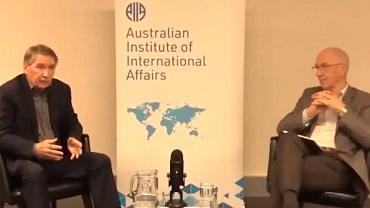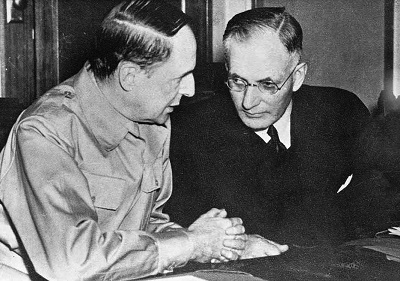The contrived fear and distrust of China that pervades Australia today is largely the result of a years-long propaganda campaign orchestrated by Canberra’s defence and intelligence establishment, designed to ensure continued compliance with an Anglo-American geopolitical agenda that runs against our actual national interest. Prime Minister Scott Morrison’s sycophancy, lust for power and lack of moral fibre have made him the ideal front-man for this operation, ever since he seized the nation’s top elected office in a palace coup in August 2018. But as every tradesman knows, an ill-made tool is apt to turn in the hand. Morrison’s clumsy attempts during the past fortnight to parlay anti-China hysteria into electoral advantage, by denouncing Opposition Leader Anthony Albanese and other senior Australian Labor Party MPs as “appeasers” of China, have prompted not only stinging rebukes from senior retired intelligence officers, but an unprecedented public intervention by the head of the Australian Security Intelligence Organisation (ASIO). Spruiking Sinophobia for geopolitical purposes is one thing, and indeed ASIO regularly does so via its assets in academia and the media.1 But like his apparent role model US Senator Joe McCarthy’s witch-hunt against the US Army in the 1950s, Morrison’s attacks on Labor—whose foreign policy is in fact practically identical to the government’s—are so hysterically implausible that they undermine the credibility of the entire edifice of anti-China propaganda ASIO itself has meticulously constructed over most of the past decade.
In his annual “threat assessment” speech on the evening of 9 February, Director-General of Security (DGS) Michael Burgess described in deliberately vague terms how ASIO had “recently detected and disrupted a foreign interference plot in the lead-up to an election in Australia”. He did not reveal which jurisdiction, political parties or level of government had been targeted, nor which foreign government had been behind the alleged plot; moreover, he spoke in the past tense throughout, implying that the election in question was by now done and dusted. In Parliament the following day, however, Defence Minister Peter Dutton insinuated that Burgess had been referring to a Chinese government operation targeting Labor Party candidates for the upcoming federal election, due in May. The Communist Party of China (CPC) had “made a decision about who they’re going to back in the next federal election”, Dutton claimed. “They have picked this bloke [Albanese] as that candidate.”
Every day for the remainder of the 9-17 February Parliamentary sitting, Morrison took every opportunity to make increasingly shrill accusations in the same vein. On 16 February he went so far as to label ALP deputy leader Richard Marles MP a “Manchurian candidate”—that is, a brainwashed asset of the CPC—over a speech he had given at the Beijing Foreign Studies University in September 2019, at an event marking the 70th anniversary of the founding of the People’s Republic of China (PRC) in 1949. With the usual caveats about the “rules-based order” and Australia’s “bedrock” alliance with the USA, Marles had celebrated the mutually beneficial trade ties and academic exchange that have flourished since Labor PM Gough Whitlam and Premier Zhou Enlai restored diplomatic relations in 1972, and called for greater bilateral cooperation in areas of mutual interest, as the government itself was still doing at the time. The generally positive tone of his speech notwithstanding, however, “the idea … [that] Marles is a ‘Manchurian candidate’ is laughable to those in the know”, political correspondent Andrew Tillett pointed out in the 19 February Australian Financial Review. In fact, he wrote, “Marles is probably the shadow cabinet’s most hawkish member.”
Most ridiculous of all was Morrison’s claim, repeated verbatim by most mainstream media, that a 14 February article in China’s Global Times which described him as a “clown” and Albanese as a “safe leader” constituted an endorsement of Albanese by the CPC. Leaving aside that whilst it is stateowned, the Global Times is not an official news service of either the Chinese state or the CPC (those roles belong to Xinhua and the People’s Daily, respectively), the article in question was not an editorial statement anyway. It was an opinion piece by Bruce Haigh, a retired Australian diplomat who is a staunch critic of both major parties. Far from giving Albanese a glowing endorsement, Haigh bemoaned that whilst he would be preferable to Morrison, Albanese “is not an intellectual … has demonstrated a propensity to believe the US view of the world without analysis … [and] could never be compared to Whitlam. He is not a lateral thinker, he is not creative, he will not be a charismatic leader.” Albanese “positively shines” in comparison to Morrison, Haigh opined, only because of the “abysmal state of Australian politics” in general, and he is likely to win the election “not because of anything he has done but because Morrison’s LNP [Liberal-National Party coalition] is imploding”. A reset of the relationship with China therefore remains unlikely, Haigh suggested, since regardless of which party is in government, “Australian leadership is weak and American pressure is sustained.”
‘Not helpful’
And there, as the Bard would have it, is the rub. Australia’s pretence of “democracy”, and with it the power of those like ASIO who pull the strings from behind the curtain, stands or falls by the public perception of significant differences between the major parties’ economic, national security and foreign policies, where in reality none exist. Morrison and Dutton’s attempts to use China as an election “wedge” issue only draws attention to that fact. As Allan Gyngell, a retired senior public servant and diplomat who in 2009-13 was directorgeneral of Australia’s peak intelligence agency the Office of National Assessments (ONA; now Office of National Intelligence, ONI), told the 17 February Sydney Morning Herald, “An effective wedge has to be made out of something more solid than wishful thinking.” There are in fact no substantive differences between the Coalition and Labor on foreign policy, he told the SMH. “The language will differ person to person, but on the key policy issues, which is what matters … I think it’s clear”, Gyngell said.
The prospect of a rupture in Canberra’s vaunted “bipartisanism” on foreign policy has thus sufficiently alarmed the intelligence establishment that on 16 February, Burgess took the extraordinary step of appearing on ABC’s 7.30 program to deliver what to this author’s knowledge was the first public rebuke of a sitting PM by a serving Director-General of Security in ASIO’s 72-year history. Espionage and foreign interference—targeting all political parties—have now supplanted terrorism as Australia’s principal security concern, Burgess told 7.30 host Leigh Sales. “But in terms of foreign interference in the federal election”, Burgess said, “we don’t believe that a foreign government could actually change the outcome of our election” (emphasis added), nor unduly influence candidates without drawing ASIO’s attention. Asked about Morrison’s attack on Marles in Parliament that day, and the politicisation of national security in general, Burgess said: “The ASIO Act requires us to be apolitical. I take that very seriously, so I’ll leave the politics to the politicians; but I am very clear, with everyone that I need to be, that that’s not helpful for us.”
Former DGS (1996-2005) Dennis Richardson was more forthright, blasting Morrison’s antics as themselves a threat to national security. “The tradition in Australia has been that governments seek to promote bipartisanship on critical national security issues”, the SMH quoted Richardson, who was also ambassador to the USA in in 2005-10, secretary of the Department of Foreign Affairs and Trade in 2010-12, and defence secretary in 2012-17. “Of course, you might have differences here and there, but on an issue as central as China, it is clearly in the national interest for there to be a bipartisan approach. And up till now, there has been…. [Manufacturing] artificial partisan differences is not in the national interest”. And whilst Richardson also praised what he called the government’s “excellent record on national security”, including its “passage of significant legislation”, this should not be read as a blanket endorsement. Both he and Gyngell have previously called for “sensible engagement” with China and publicly criticised the government’s needless antagonism, including its tearing up of research collaboration between Australian and Chinese universities, as well as the confected scandal over the lease of the Port of Darwin to Chinese company Landbridge Group, which Richardson dismissed as “alarmist nonsense”.2 In June 2020 they also slammed the China-bashing “Wolverines” parliamentary clique—a bipartisan gaggle of US-loyalist MPs and Senators named after the heroes of the 1984 Hollywood movie Red Dawn, wherein a group of high-schoolers wage guerrilla war against invading Soviet and Cuban paratroopers—as “immature, juvenile and destructive” (Gyngell) and “add[ing] no value” to the China debate (Richardson).3
The SMH also quoted Professor Rory Medcalf, a former ONA analyst and diplomat who now heads the National Security College at the Australian National University in Canberra, who described Morrison’s smear campaign as “political overreach”. Said Medcalf, “On the one hand, the government is rightly telling our AUKUS [Australia-United Kingdom-United States security pact] allies that this is a ‘forever friendship’ and we can be totally trusted with their technology crown jewels [e.g. nuclear submarines] for decades to come. And we are properly telling India and Japan they can rely on us, that Australia will never again wobble on Quad solidarity like we did in 2008. Then in the next breath we hear that all bets are off if there’s a change of government a few months from now.”
The more things change …
The sad truth, as Sydney University historian Prof. James Curran noted 20 February in the Australian Financial Review, is that there has been no real difference between the Labor and Liberal parties on foreign policy in decades. Thus, instead of responding to Morrison’s slurs from a position of principle, and perhaps laying out for the Australian people a strategy to restore relations with China, Labor instead hurried to join him in the gutter, with Albanese seizing on Burgess’s remarks to call Morrison himself the “real Manchurian Candidate” for supposedly serving China’s interests by sowing divisions it can exploit.
Yet as Gyngell noted to the AFR’s Andrew Tillett in the above-cited article, Labor has history on its side. Gyngell pointed to the 1950s, when Labor itself famously split over the issue of communism and relations with the Soviet Union, as the last time the national security debate was “so partisan and ferocious” as today, Tillett reported. “‘The difference then is there were genuine differences in policy between the two sides’, says Gyngell”, he went on; and then, remarkably, acknowledged: “Even when Labor was at odds with the government over Vietnam at the 1966 election and Iraq War in 2004 (and lost both elections, but was vindicated by history), the debate ‘wasn’t as personal and over the top’ as now, [Gyngell says].” (Emphasis added.)
Curran casts even farther back, citing then-Opposition Leader John Curtin’s 1937 campaign, wherein he was labelled a traitor, “disloyal” and “suicidal” by ex-Labor turncoat PM Joseph Lyons of the conservative United Australia Party (the forerunner of today’s Liberal Party; no relation to mining magnate Clive Palmer’s political vehicle of the same name) for daring to question the British Empire’s willingness and ability to defend Australia “in the event of a simultaneous war in Europe and the Pacific”, and proposing Australia organise its own national defence instead. But Curtin was right, wrote Curran; and it was he who “shouldered national leadership in the darkest days of late 1941 and early 1942”, won the war by defying Britain and allying with Franklin Roosevelt’s USA (a far cry from the present version), and “restored Labor’s credibility on foreign affairs and defence” in the process. He did so, wrote Curran, “by espousing a practical patriotism and by articulating an affection for the country and its wellbeing that wasn’t strangled by a Union Jack”.
Add some stars and stripes to the noose, and the situation is indeed remarkable similar to today—except that sadly, there is no John Curtin in today’s ALP.
Footnotes:
By Richard Bardon, Australian Alert Service, 23 February 2022








